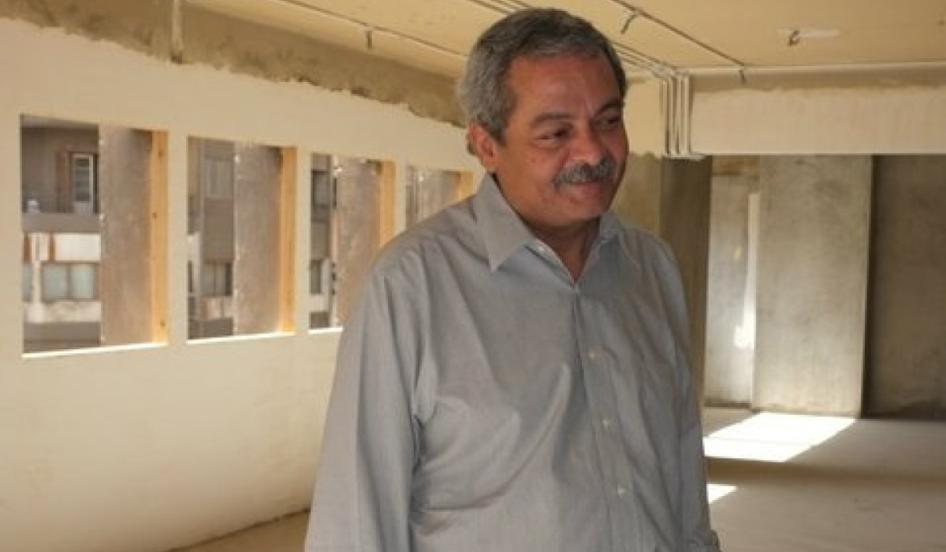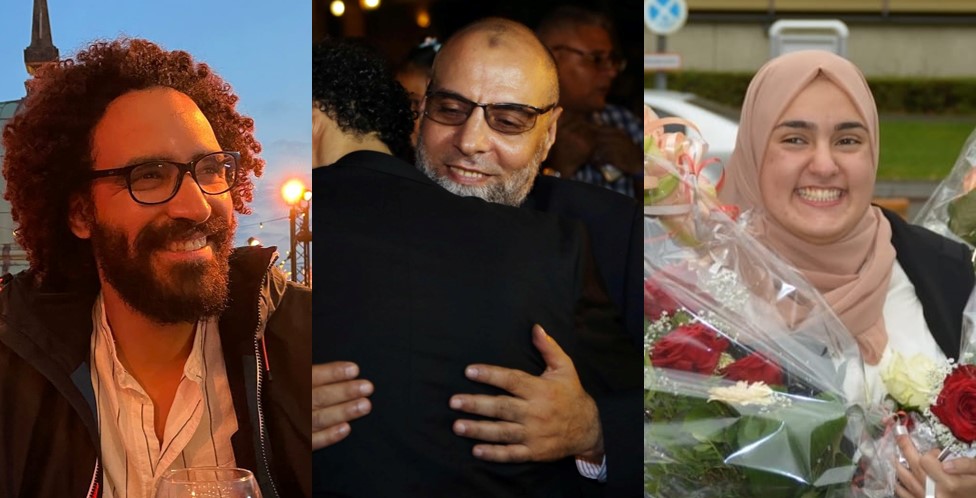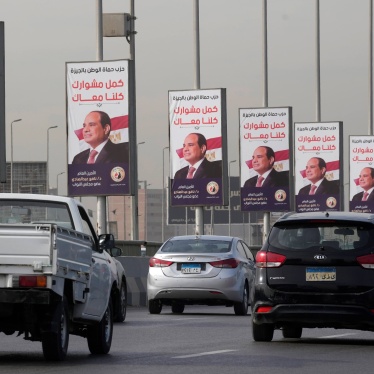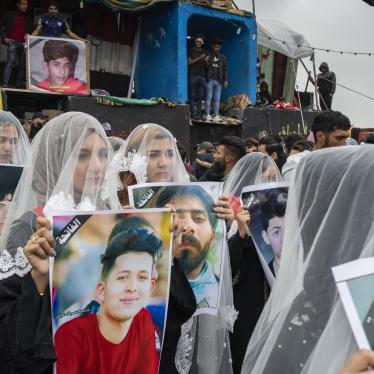(Beirut) – Egyptian authorities have unlawfully detained a prominent critic and veteran news publisher and referred him for prosecution apparently based solely on his peaceful criticism, Human Rights Watch said today.
Egyptian authorities detained Hisham Kassem on August 20, 2023, and prosecutors quickly referred him for an “urgent trial,” which began on September 2, on charges of libel and slander related to online posts critical of a former government minister. His prosecution is part of a new wave of free speech prosecutions against critics, continuing Egypt’s relentless repression.
“Egyptian authorities' use of criminal defamation laws to muzzle critics like Hisham Kassem is just one of myriad tools they use to ensure that critical speech leads straight to prison,” said Amr Magdi, senior Middle East and North Africa researcher at Human Rights Watch. “The authorities should free Kassem immediately or produce evidence of a recognizable criminal offense.”
On September 2, the Cairo Economic Court adjourned the hearing until September 9, sending Kassem to pretrial detention, local media reported . Lawyers present at his interrogation on August 20 said that the public prosecution charged Kassem with libel and slander against a former manpower minister, Kamal Abu Eita, based on a Facebook post.
The authorities added vague, broadly worded charges of intentionally “disturbing the authorities” and slander against policemen in Cairo’s el-Sayda Zainab Police Station, where Kassem was first interrogated. Nasser Amin, a prominent human rights lawyer who attended Kassem’s interrogating, told Human Rights Watch that the “disturbing the authorities” charge is in relation to a tweet Kassem posted in which he said he refused to pay bail and that he is “more honorable than Abdel Fattah el-Sisi and all his men.” At the first trial session, Kassem’s lawyers told the judges that he had begun a hunger strike.
Kassem participated in late June in founding the Liberal Free Current Movement, which said on its inauguration that it aims to be a coalition representing several liberal political parties critical of al-Sisi’s government. Over the past few months, Kassem has criticized the government’s economic policies and the role of military in political life.
The prosecution appears to have been marked by fair trial violations. Based on media statements by his lawyers, the authorities did not allow them to review or obtain a copy of the case files before his trial began, hindering their ability to adequately prepare a defense. The court also barred journalists from the trial without explanation, local media reported.
The Egyptian government has an infamous record using defamation charges against journalists and dissidents. In September 2022, prosecutors interrogated four journalists for the independent news website Mada Masr on charges including defamation against members of the pro-government Nation’s Future Party, then released them on bail. The charges remain in place, but the trial has not moved forward. In February 2023, three of the four were referred to trial on separate charges of insulting members of parliament from the same pro-government party and misusing social media.
The authorities have been engaged in a broad pattern of harassment and intimidation against families of dissidents living abroad.
In August, Egyptian authorities arrested and charged the fathers of Ahmed Gamal Ziada, an Egyptian journalist living in Brussels who was previously detained and tortured in Egypt, and Fagr al-Adly, a German-Egyptian doctor and activist, who had interrupted a news conference in Berlin in 2015 with President al-Sisi and the then-German Chancellor, Angela Merkel, calling al-Sisi a “murderer,” “Nazi,” and “fascist.”
Both Ziada and al-Adly told Human Rights Watch that prosecutors kept their fathers in pretrial detention after charging them with “spreading false news,” which the authorities frequently use against critics and journalists. The Supreme State Security Prosecution renewed their detention remotely through a videoconference system, which is inherently abusive as it undermines detainees’ right to be taken before a judge to assess the legality and conditions of detention and the detainees’ wellbeing, and denies them an opportunity to speak to their lawyers in private.
Ziada said that his father was abducted in broad daylight near his home in Giza on August 22. The family later learned that National Security Agency agents questioned him primarily about his son’s activism abroad, Ziada said.
Al-Adly said that prosecutors failed to present any evidence of wrongdoing against her father, whom security officers arrested at Cairo airport when he arrived from Germany on August 18, and that they also questioned him about her activism. Al-Adly said her father began a hunger strike on September 3 to protest his treatment. She also said that a protest she planned with her brother in front of the German embassy in Cairo on September 3 was interrupted by a “heavy security presence” and that officers were filming them.
On September 2, an Egyptian court sentenced Mohamed Adel, an activist and former leader of Egyptian April 6 Youth Movement, who has been in unlawful pretrial detention since 2018, to four years in prison on charges of “spreading false news,” his lawyer posted to X, formally known as Twitter. The indictment, which Human Rights Watch reviewed, said that Adel was charged with spreading false news based solely on online posts critical of the government. At least one post presented by prosecutors was related to criticism against loan agreements with the International Monetary Fund (IMF). Adel had previously served three years in prison in a case stemming from peaceful protest, and had been released in 2017.
Another activist, Ahmed Hamdy al-Sayed, also known as Gika, is in pretrial detention facing charges including spreading false news, a human rights lawyer told local media. The authorities have intermittently held Gika incommunicado since his initial summons in June.
On August 19, a member of the presidential pardon committee – created by President al-Sisi to review pretrial detainee cases – announced a list of 30 detainees held for spreading false news whose release had been ordered. However, al-Manassa, an independent news website, reported that judges had renewed the pretrial detention of more than 15 of them.
The Egyptian Penal Code as well as the Egyptian Telecommunication Regulatory Law No. 10 of 2003 contain a number of vague provisions on criminal defamation and related publishing offenses that provide for up to five years in prison. Such punishments are incompatible with Egypt’s obligations to protect freedom of speech under international human rights law.
Under international law, any restrictions on speech should be proportionate and based on clear laws that set out the prohibitions in a way that people can reasonably predict what constitutes a violation. The United Nations Human Rights Committee, which oversees the International Covenant on Civil and Political Rights, which Egypt ratified in 1982, has said that “harassment, intimidation or stigmatization of a person, including arrest, detention, trial or imprisonment for reasons of the opinions they may hold, constitutes a violation”.
The committee has stated its disapproval of laws that criminalize insulting the head of state, government officials, or national symbols. It has made clear that “in circumstances of public debate concerning public figures in the political domain and public institutions, the value placed by the covenant upon uninhibited expression is particularly high.”
“Al-Sisi’s government makes a great show of releasing a few unjustly detained activists every now and then, but all the while the machinery of oppression ensures that new critics are taken to prison every day,” Magdi said. “The government is still determined to bully all Egyptians into complete submission.”








